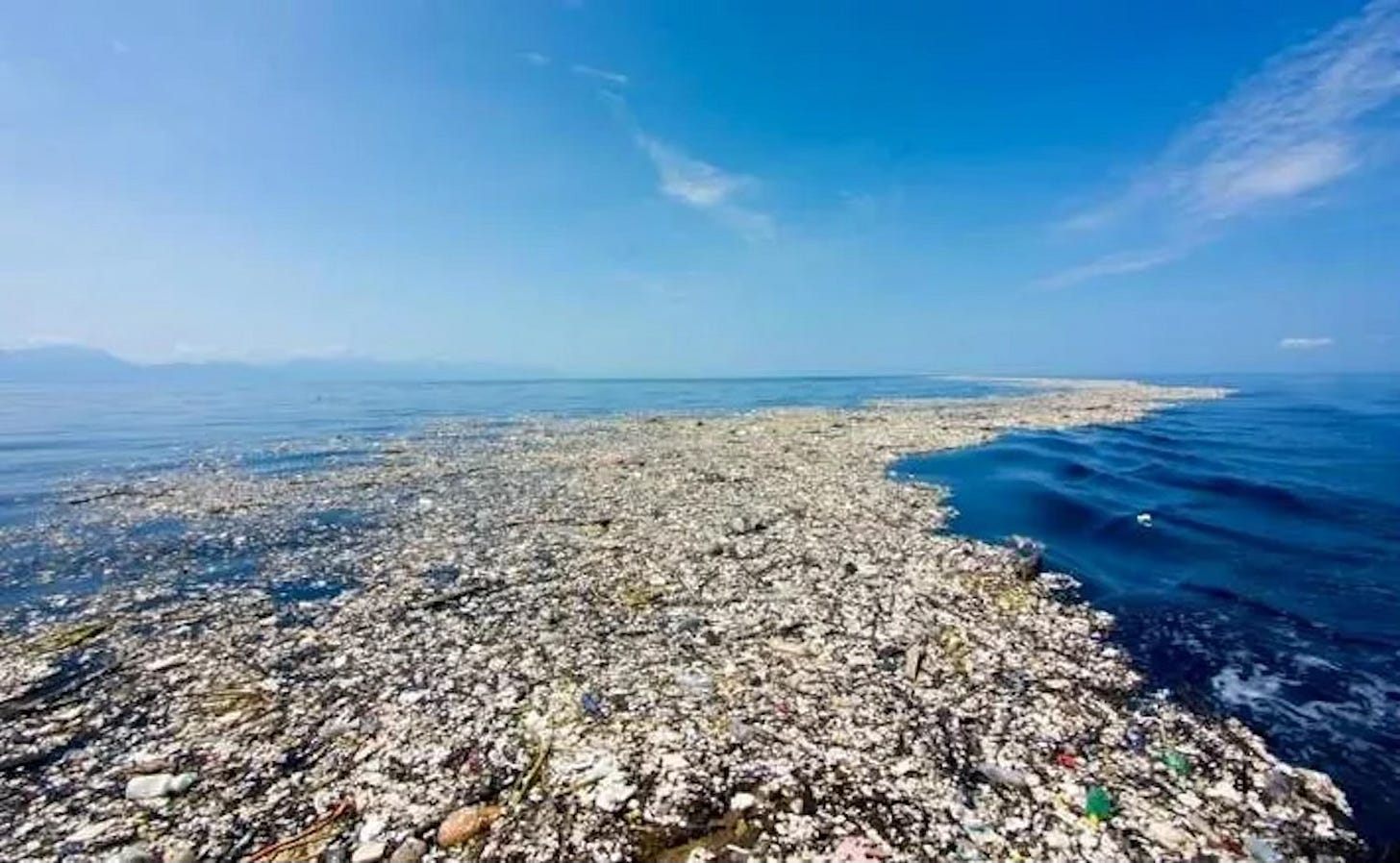"Why Won't You Just Obey?"
Remember the brouhaha about the Great Pacific Garbage Patch, the giant mass (two, actually) of garbage twice the size of Texas? Remember how the big remedies proposed by our Best-and-Brightest involved our abandonment of plastic straws and a prohibition on single-use plastic shopping bags? Like every great moral crisis, it began as outrage, created opportunity for virtue-signal, and ended when some midwit politicians enacted some "Thou Shalt Not..." laws.
Laws that some of us knew were stupid, that didn't actually address the problem (the vast majority of that plastic comes from Asian countries), and that wound not only fail to work but would make things worse.
Behold, the fallout from Governor Phil Murphy' (D-NJ) plastic bag ban: Plastic bag usage, by weight, has tripled, and emissions from the manufacture of plastic bags increased. Turns out, those reusable bags, each of which uses 15-20 times more plastic than the banned ones, only get used a couple or perhaps a few times each.
Reason magazine offers a video series on YouTube called Great Moments In Unintended Consequences. Each example is offered with the observation:
Sounds like a great idea!
With the best of intentions!!
What could possibly go wrong!?
Even the most goo-goo government apologetic among us knows, deep down, that government is spectacularly good at one thing: getting things wrong. Yet, even the more government-suspicious among us tend to default to "something must be done, therefore government" when we perceive a problem. We’ve been that conditioned by relentless messaging. No matter if that problem is real, exaggerated, or imagined, and no matter if the proposed remedies are retreads of past failures, likely-to-certain to fail, or just plain idiotic.
At the heart of all this is a dehumanization: the notion that citizens are pets, who can be brought to heel with the proper application of punishment and reward.
That attitude, and its rebuttal, are aptly summarized in an exchange between Captain Jack Aubrey and his friend/seafaring companion, Dr. Stephen Maturin, from Master and Commander.
Aubrey: Men must be governed! Often not wisely, I will grant you, but governed nonetheless.
Maturin: That's the excuse of every tyrant in history, from Nero to Bonaparte. I, for one, am opposed to authority...
Aubrey: Your opposition is not my concern.
Maturin: -it is the egg of misery and oppression...
Aubrey: You've come to the wrong shop for anarchy, brother.
It has been historically demonstrated that governance of a limited form, such as is written in the American Constitution (that our leaders swear to uphold then promptly ignore), is better than the alternatives, whether those alternatives be anarchy or any of the "heavier-hand" forms we find across human history. What's going on in America (or most of the rest of the world) today is not that.
It's not "governance."
It's not "representative" or "public service."
It's "management."
Of our money, of our movement, of our speech, and of our behavior.
Government is obligated to protect our (individual and property) rights and maintain our aggregate security. Beyond that, when it gets involved, it should prioritize accommodating or facilitating.
Single-use plastic bags are popular and economical. They are more efficient to produce (less energy, fewer raw materials) than multi-use plastic or canvas or paper, more hygienic, and not really single-use. In our household, we use(d) them as trash pail liners, boot covers, for cleaning litter boxes, and more. Yes, they eventually end up in the trash, but their absence forces us to buy other bags for our trash pails and litter boxes, to buy boot covers, and to buy other stuff in their stead.
How much effort can it possibly it take to figure this out? More, apparently, than the people who pressed for, wrote, and enacted the bag ban cared to expend.
Beyond that shallowness of thought, there's the forever "problem" of noncompliance. People can be goaded by hype and outrage in the short term, but history proves that prohibitions don't work, and as soon as the "do-goodery" of metal straws and (bacteria-haven) canvas shopping bags lost its sheen, people found ways to work around the bans. Since bans are market distortions, those ways are inevitably less efficient/utile than what the market sorted out.
The title of today's piece is the subconscious plaint of everyone who "knows better" and would coerce other people's behaviors. No matter how often it's demonstrated that humans are an ornery bunch who are disinclined to obey when our "betters" tell us how to behave, and no matter how contrary to the premise of individual liberty and sovereignty this perpetual desire to bend us to their will may be.
Rather than impose hasty, more-show-than-utility restrictions and bans on us, our government should work to "accommodate and facilitate." If ocean plastic is a problem generated by our current trash-management approach (again, it's not us), then the approach should be looked at (as in, landfill it rather than letting it find its way to the Pacific) rather than attempting behavior modification.
The former is public service, the latter is management of the masses.
Public service is what's demanded in and by a free society.
Management of the masses promotes tyranny.



I've visited Kenya, a beautiful country, if you can ignore all the trash everywhere. I asked why it is so. The answer: there are no trash receptacles, and even if there were, there are no trucks to empty them, and even if there were trucks, there are no landfills to dump it. However, the Kenyan government has banned plastic shopping bags. There is no movement, that I'm aware of, to establish landfills and such.
My wife and I bought groceries Saturday, and I went out to our vehicle as she finished and paid. Our items were in “old school” paper bags. I wonder if this was temporary, or part of a more permanent trend? Mind you, we live out in the middle of, “Bum (Copulation)” Georgia - hardly a socially “cutting edge” place.